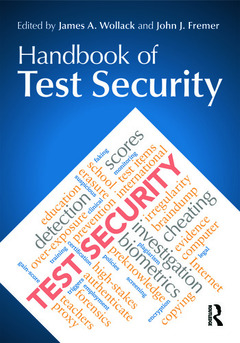Handbook of Test Security
Coordonnateurs : Wollack James A., Fremer John J.

High stakes tests are the gatekeepers to many educational and professional goals. As such, the incentive to cheat is high. This Handbook is the first to offer insights from experts within the testing community, psychometricians, and policymakers to identify and develop best practice guidelines for the design of test security systems for a variety of testing genres. Until now this information was scattered and often resided inside testing companies. As a result, rather than being able to learn from each other?s experiences, each testing entity was left to re-create their own test security wheel.
As a whole the book provides invaluable insight into the prevalence of cheating and ?best practices? for designing security plans, training personnel, and detecting and investigating misconduct, to help develop more secure testing systems and reduce the likelihood of future security breaches. Actual case studies from a variety of settings bring to life how security systems really work. Examples from both domestic and international programs are provided. Highlights of coverage include:? Best practices for designing secure tests
? Analysis of security vulnerabilities for all genres of testing
? Practical cheating prevention and detection strategies
? Lessons learned in actual security violations in high profile testing programs.
Part I focuses on how tests are delivered for paper-and-pencil, technology-based, and classroom testing and writing assessment. Each chapter addresses the prevalence of the problem and threats to security, prevention, and detection. Part II addresses issues essential to maintaining a secure testing program such as planning and monitoring, physical security, the detection of group-based cheating, investigating misconduct, and communicating about security-related issues. Part III examines actual examples of cheating-- how the cheating was done, how it was detected, and the lessons learned. Part III provides insight into security issues within each of the Association of Test Publishers? four divisions: certification/licensure, clinical, educational, and industrial/organizational testing. Part III?s conclusion revisits the issues addressed in the case studies and identifies common themes.
Intended for organizations, professionals, educators, policy makers, researchers, and advanced students that design, develop, or use high stakes tests, this book is also ideal for graduate level courses on test development, educational measurement, or educational policy.
J. A. Wollack, J.J. Fremer, Introduction: The Test Security Threat. Part I. Designing Secure Delivery Systems.J.J. Fremer, S. Ferrara, Security in Large-Scale, Paper and Pencil Testing. D. Foster, Security Issues in Technology-Based Testing. L. Woodruff, Security Issues in Classroom Testing. S. Lane, Security Issues in Writing Assessment. Part II. Important Issues In Test Security.C. T. Fitzgerald, J. R. Mulkey, Security Planning, Training, and Monitoring. A. R. Scicchitano, R. D. Meade. Physical Security at Test Centers and The Testing Company. D. Maynes, Educator Cheating and the Statistical Detection of Group-Based Test Security Threats. D. J. Harris, R. R. Watkins Schoenig, Conducting Investigations of Misconduct. S. M. Case, B. E. Donahue, Security-Related Communications. J. A. Semko, R. Hunt, Legal Matters in Test Security. Part III. Lessons Learned From Practice: Case Studies From A Variety Of Disciplines.J. D. Carson, Certification/Licensure Testing Case Studies. K. M. Williams, S. Rzepa, G. Sitarenios, H. Wheldon, Clinical Testing Case Studies: Prevention, Detection, and Management of Falsified Test Development Data. N. Kingston, Educational Testing Case Studies. D. Bartram, E. Burke, Industrial/Organizational Testing Case Studies. W. A. Hatherill, Commentary on Case Studies. J. J. Fremer, James A. Wollack, Conclusion: The Future of Test Security.
James A. Wollack is an Associate Professor of Educational Psychology at the University of Wisconsin-Madison, where he serves as the Director of Testing & Evaluation Services and the University of Wisconsin Center for Placement Testing, and as the Research Director for the General Education Assessment. Wollack has published numerous journal articles and book chapters and is a frequent presenter at national conferences on topics such as detection of answer copying, test security, score scale stability, test construction, and test speededness, including having co-authored the chapter on test administration, security, scoring, and reporting for the 4th edition of Educational Measurement. Wollack frequently serves as a consultant or expert witness on cases involving suspected cheating on high-stakes exams, and has presided over many cases of alleged student academic misconduct at the University of Wisconsin. He currently sits on the Board of Directors for the National Council on Measurement in Education (NCME), and is very active in the American Educational Research Association (AERA), the Measurement Services Special Interest Group of AERA, the Association of Test Publishers (ATP), and the National College Testing Association (NCTA).
Wollack earned a B. S. with honors in Psychology from the University of California at Davis, and a M.S. and Ph.D. in Educational Psychology from the University of Wisconsin-Madison.
John J. Fremer is currently President, Caveon Consulting Services, and a Founder of Caveon Test Security, a company that helps prevent and detect test fraud, including cheating and test piracy. Fremer has held management level positions in test and test program development at Educational Testing Service and The Psychological Corporation/Harcourt.
Fremer is a Past President of the National Council on Measurement in Education (NCME) and a former editor of the NCME journal Educational Measurement: Issues and Practice. Fremer al
Date de parution : 04-2013
17.8x25.4 cm
Date de parution : 04-2013
17.8x25.4 cm
Thèmes de Handbook of Test Security :
Mots-clés :
takers; sponsor; proxy; taker; testing; program; administration; administrators; booklets; content; Test Security; Proxy Test Takers; Security Incident Response Plan; Test Security Violations; Test Sponsor; Test Security Plan; Cheating Detection Methods; Test Taker; Test Prep Companies; Educator Cheating; Atlanta Public Schools; Test Program Managers; Test Fraud; Fraudulent Data; Academic Dishonesty; Test Administration; Proxy Testing; Exam Content; Test Theft; Nim; Test Booklets; Suspicious Site; Test Administrators; Cambridge ESOL; Data Collection Sites



